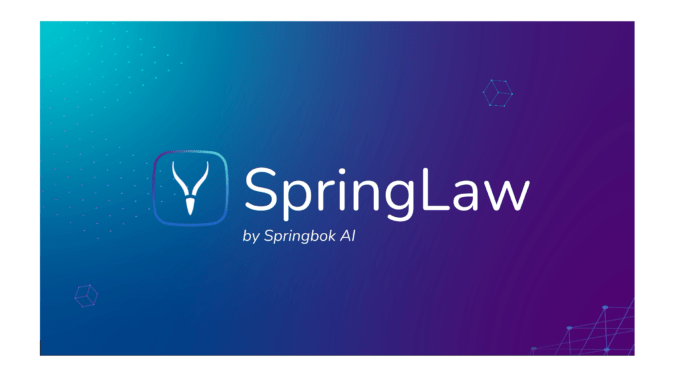- Springbok AI introduces SpringLaw, a no-code toolkit for legal innovation.
- SpringLaw enables creation of custom solutions atop Legal Language Models (LLMs).
- Comprising modules like Wizards, Chats, and Tables, it streamlines workflow automation and client solutions.
- Unique prompt architecture ensures secure data extraction.
- Endorsements from industry experts highlight its effectiveness and user-centric design.
Main AI News:
In the realm of legal technology, the age-old debate of buying versus building solutions has found a new contender: Springbok AI’s latest offering, SpringLaw. This no-code toolkit is set to revolutionize how law firms and in-house teams approach the integration of Legal Language Models (LLMs) into their workflows.
Having undergone rigorous testing in a private beta phase, SpringLaw is now poised for a broader release, promising to democratize the creation of custom ‘wrappers’ atop LLMs. Branded as a “powerful LLM-agnostic solution,” SpringLaw aims to empower users to harness the potential of generative AI, transforming knowledge and processes into actionable tools for everyday tasks and client-centric solutions.
In essence, for those inclined towards building rather than buying, SpringLaw offers a compelling proposition. Victoria Albrecht, CEO of Springbok AI, emphasized the transformative nature of SpringLaw, stating, “With the launch of our game-changing SpringLaw tool suite – Wizards, Chats, and Tables, we’ve elevated the process of translating firms’ myriad use case ideas into tangible solutions.”
The SpringLaw platform comprises three key modules:
- Wizards: Facilitating the creation of reusable workflow tools and client solutions tailored to specific knowledge and processes. Configurable to accommodate diverse needs, Wizards streamlines the creation and sharing of templated document generators, assistants, and workflow automations.
- Chats: Enabling legal professionals to interactively engage with multiple documents, be it contracts, reports, or RFPs. Leveraging existing prompts or creating bespoke libraries, Chats facilitates tasks such as summarization, drafting, and extraction of information.
- Tables: Offering swift information structuring and analysis capabilities, Tables empower users to sift through vast document repositories with ease, enabling tasks such as portfolio assessments and competitor monitoring.
However, what sets SpringLaw apart is its unique prompt architecture methodology, ensuring secure and efficient extraction of information from data. With robust encryption measures in place, SpringLaw guarantees data integrity whether hosted by Springbok or on-site.
Innovation expert Joe Cohen, formerly with Dentons and now at Charles Russell Speechlys, lauds SpringLaw’s versatility and user-centric design. Cohen remarked, “SpringLaw’s tailored approach resonates with our vision of leveraging AI to craft bespoke client solutions. The platform’s ease of use and collaborative features make it an invaluable asset for our team.”
Conclusion:
Springbok AI’s SpringLaw marks a significant shift in the legal tech landscape, offering a robust framework for DIY legal innovation. With its user-friendly interface and emphasis on customization, it is poised to drive efficiency and agility within law firms and in-house legal teams. This signals a growing trend towards tailored AI solutions tailored to specific industry needs, heralding a new era of innovation in the legal sector.

